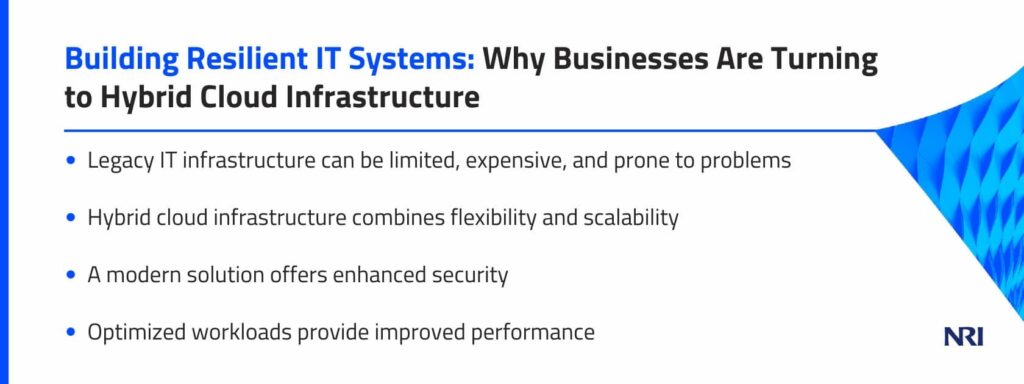優れた柔軟性と拡張性を備えたハイブリッド・クラウド・インフラは、現代のビジネスにとって好ましいソリューションとなっている。

デジタルの世界は変化しているだけではありません。新しいテクノロジーは、より良い働き方への扉を開くと同時に、サイバー犯罪者が忍び込む手段を増やすことにもなる。
そのため、ハイブリッド・クラウドのセットアップに傾倒する企業が増えている。ハイブリッド・クラウドは、柔軟性と信頼性を提供することで、技術的な課題に足をとられることなく、シャープに、データを安全に保ち、ビジネスを成長させることができる。
世界的に見ると、クラウド・コンピューティング市場は2010年の246億3000万ドルから10年間で1564億ドルに成長し、 2028年には1兆ドルを超える規模になると予測されている。企業は先手を打つために、今すぐ最適なシステムを導入しなければならない。
弾力性のあるITシステムを導入するには、さまざまな企業に ハイブリッドインフラストラクチャソリューションを提供し、成功を収めてきた実績ある専門知識を持つデジタルトランスフォーメーションパートナーが必要です。お客様のニーズに合わせたシステムにより、コストを管理し、アプリケーションのライフサイクルを管理し、無駄をなくし、スプロールを最小限に抑え、エラーの起きやすいレガシー機器を近代化することができます。
従来のITインフラが抱える課題
レガシーなITシステムに慣れ親しみ、変更やアップデートに消極的になっているかもしれない。コンフォートゾーンから自分を押し出すことは時に挑戦的ですが、時代遅れのテクノロジーによってどのように足かせになっているかを見直すことは良い習慣です。
社内レガシーシステムの大きな欠点のひとつはコストです。IT予算の大部分、おそらくは大半を修理やメンテナンスに費やすことになり、ITスタッフの時間が奪われ、重要なビジネス機能の管理から遠ざかってしまいます。
コストは、必要な保守や修理のほか、ダウンタイムやパフォーマンスの低下に伴う損失で測ることができる。
ビジネスが成長し、使用量や需要が突然急増した場合、レガシー・システムでは単に追いつくことができず、最も厄介なタイミングで容量の問題が発生します。
レガシーシステムはまた、部品やその使用に関する知識が乏しくなるにつれて、時間の経過とともに修理や運用が難しくなっていく。
さらに、レガシーシステムは、セキュリティパッチや重要なビジネスアプリケーションの最新版へのアップデートが難しくなり、高額なサイバー侵害や業務遂行能力の低下のリスクにさらされることになる。
ハイブリッド・クラウドが支えるITシステムの強靭性
弾力性のあるハイブリッド・クラウド・アーキテクチャでは、豊富な機能を備えたクラウド・システムの利点と、頼りにしている社内テクノロジーの信頼性を組み合わせることができます。ニーズに応じて、クラウドと社内インフラの間でワークロードを分割することも可能です。
オンプレミスのセキュリティが提供する安心感と、需要に応じて迅速にスケールアップ/ダウンできるクラウドシステムのデータハンドリングとダイナミックな利点の両方を手に入れることができます。最適なハイブリッド・クラウド型セキュリティ・ソリューションは、ネットワーク全体のセキュリティを一元管理するハブをビジネスに提供します。
また、ハイブリッド・クラウド・システムは冗長性を確保し、フェイルオーバー・システムによって中断のないオペレーションを可能にする。
また、プライベート・クラウドとパブリック・クラウドの間でワークロードを効率的に割り当てることで、コストを最適化することもできる。 マルチクラウドのセットアップには、他にも以下のような メリットがあります:
- すべてのサービスを単一のベンダーに依存しない柔軟性
- 事業継続性を確保するためにさまざまなクラウドを導入し、ディザスタリカバリを改善。
- さまざまなクラウド・ベンダーを利用することで、特定の国の規制に準拠したベンダーを利用できる可能性が高まるため、コンプライアンスが向上する。
- プライベート・クラウドとパブリック・クラウドの間でバランスを取りながら、ワークロードを最適化。
事業継続のためのハイブリッド・クラウドの主な利点
ハイブリッド・クラウド・インフラストラクチャーの利点の1つは、ディザスタリカバリの高速化である。これは、データ漏洩や地震・火災などの自然災害などの危機が発生した場合に、データやサービスを迅速に復旧させることができる。
企業はまた、ハイブリッド・クラウド・インフラを利用することで、より大きなコントロールを実現する。例えば、データやリソースを異なる場所に割り当てることで、運用面やセキュリティ面でメリットを得ることができる。機密性の高い個人情報はプライベート・クラウドや保護されたオンサイト・システムに保存し、通常のワークロードはパブリック・クラウドで実行することができる。
多くの業務をクラウドに移行することで、企業は物理的なハードウェアの保守とアップグレードの必要性を減らすことができ、その結果、設備コストを削減し、オンサイトのインフラストラクチャのハウジングと管理に関連するオーバーヘッドを削減することができる。
ハイブリッド・クラウド・システムは、ビジネスの変化に合わせて俊敏に変化し、ニーズに合わせて迅速に進化します。新しい機能を実装するのに何ヶ月もかかることはもうありません。データやアプリケーションは要件に応じて新しい場所にシームレスに移動できるため、リスク管理にも役立ちます。
NRIのハイブリッド・クラウドへの取り組み
NRIは、常にイノベーションの最先端に身を置きながら、その足元には、お客様の信頼を得ているテクノロジーをしっかりと据えています。そのため、お客様の現在のニーズを満たし、将来の変化にも対応できる強靭なITシステムを構築することができます。
例えば、スマートシティをよりスマートにするハイブリッドIT ソリューションを構築することができます。私たちは、都市の急速な成長に適応しながら、安全で効率的なサービスに対する需要の高まりに対応することを可能にします。クラウドとオンプレミスのITサービスを融合させることで、私たちは都市政府がより充実したサービスを提供し、増大するアクセシビリティと利用の要求に応え、業務効率を向上させ、持続可能性を支援します。また、消費パターンを監視し、リソース管理を最適化するための戦略的なIoT(モノのインターネット)の導入も可能です。
NRIは、お客様のニーズに合わせた弾力性のあるハイブリッド・クラウド・システムで、組織のITインフラの最適化もお手伝いします。NRIは、お客様のITインフラを最適化するお手伝いをいたします。お客様の変革は、最初のコンタクトから始まります。



